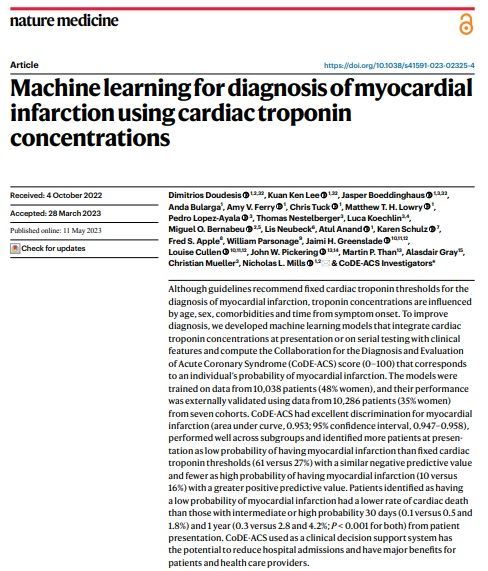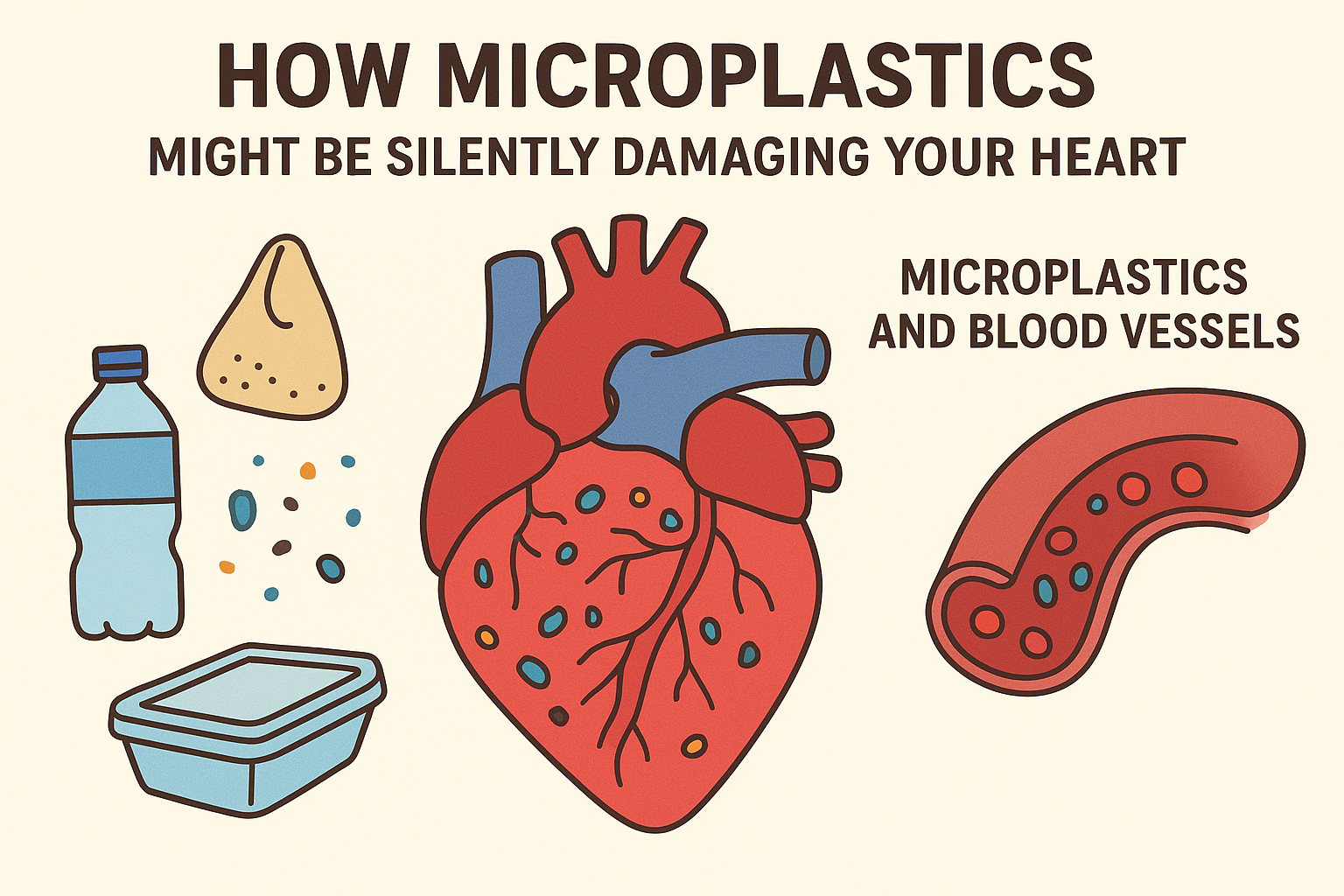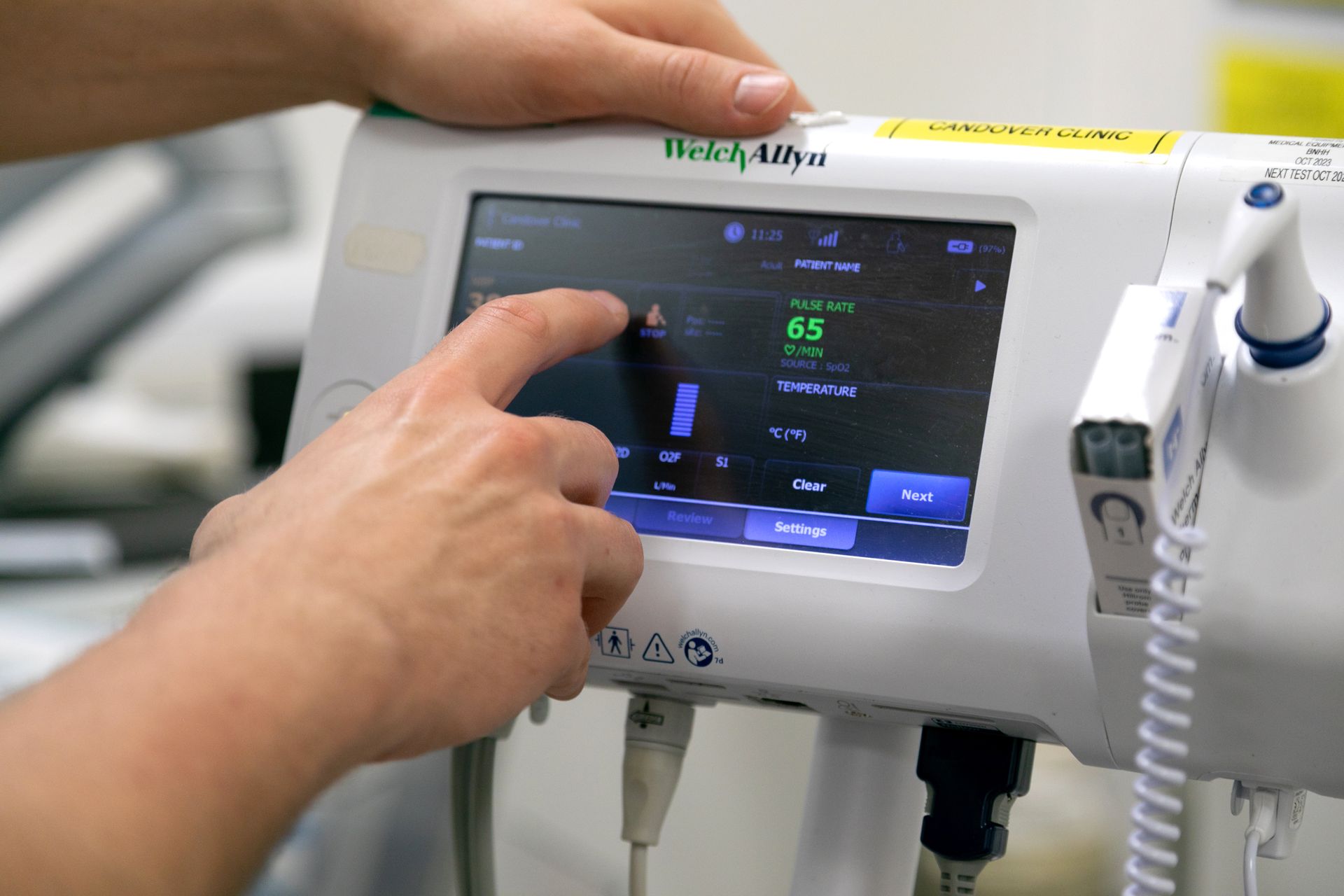ARTIFICIAL INTELLIGENCE in diagnosing HEART ATTACKS.

ARTIFICIAL INTELLIGENCE/Machine learning has the potential to improve HEART ATTACK/Myocardial infarction DIAGNOSIS, according to this trial above.
-
A large study, which was performed by the University of Edinburgh, was published in May 2023 in Nature Medicine.
- Heart attacks are diagnosed based on biomarkers called TROPONINS, but the levels can vary depending on gender, other medical conditions, age and timing of the samples.
- The researchers trained an algorithm to incorporate individual characteristics with the biomarkers based on over a 10000 patients.
- The performance of this algorithm was then compared to a similar group of patients, also just over 10000.
- The machine learning model recognised more patients as low probability of having a heart attack in comparison to Troponins threshold only (61% vs 11%) and less patients as high probability of heart attacks (10% vs 16%).
- The researchers concluded: 'CoDE-ACS used as a clinical decision support system has the potential to reduce hospital admissions and have major benefits for patients and health care providers.'
Link to the article below:
https://www.nature.com/articles/s41591-023-02325-4.pdf
-------------------------------------------------------------------------------------------------
Harnessing Artificial Intelligence in Cardiology
Introduction
Artificial intelligence (AI) has emerged as a transformative force across various industries, and the field of cardiology is no exception. With its ability to analyse large amounts of complex data and identify patterns, AI has the potential to revolutionise the way cardiovascular diseases
are diagnosed, treated, and managed. In this article, we will explore the advancements
and applications of AI in cardiology, discussing its role in risk assessment, early detection, personalized treatment, and prognostic evaluation. By harnessing the power of AI, we can enhance patient care, improve outcomes, and pave the way for a more efficient and effective healthcare system.
Main Text
AI in Risk Assessment and Early Detection
AI algorithms can analyse vast amounts of patient data, including medical history, imaging results, and genetic profiles, to identify patterns and calculate individualised risk scores. This enables healthcare professionals to predict the likelihood of developing cardiovascular diseases. AI-based algorithms showed also promise in early detection of cardiac abnormalities by analysing electrocardiograms (ECGs), echocardiograms, and other diagnostic images, assisting in the timely diagnosis and intervention for potential cardiac conditions.
AI in Medical Imaging and Diagnostics
Medical imaging plays a crucial role in cardiology, aiding in the diagnosis and assessment of various cardiovascular conditions. AI algorithms can analyse and interpret imaging data, such as cardiac MRI or CT scans, with exceptional accuracy and efficiency. This technology can assist cardiologists in the future in detecting and characterising abnormalities, quantifying ventricular function, and identifying plaque build up or stenosis in the coronary arteries.
AI in Personalized Treatment
Each patient's response to treatment can vary, and AI can potentially offer a pathway to personalised medicine in cardiology. By integrating individual patient data, including genetics, medical history, and treatment outcomes, AI algorithms can generate tailored treatment plans. This approach facilitates precision medicine, optimizing medication choices, dosage adjustments, and interventional procedures to achieve better patient outcomes and reduce the risk of adverse events.
AI in Prognostic Evaluation and Patient Monitoring
AI-powered models can potentially analyse real-time patient data, including vital signs, biomarkers, and continuous monitoring data, to predict and evaluate disease progression and patient prognosis.
Challenges and Considerations
While AI presents promising opportunities in cardiology, several challenges and considerations must be addressed. Data quality, privacy, and security are critical concerns, as AI relies on large, diverse, and high-quality datasets for accurate analysis. Collaboration between healthcare professionals, data scientists, and AI developers is essential to ensure the ethical use of AI and the integration of AI-based technologies into existing clinical workflows. Additionally, regulatory frameworks and guidelines should be established to govern the development, validation, and deployment of AI applications in cardiology.
Conclusions
Artificial intelligence is transforming the field of cardiology, revolutionizing diagnosis, treatment, and patient monitoring. By leveraging AI's capabilities in risk assessment, early detection, personalised treatment, and prognostic evaluation, we can enhance patient care, improve outcomes, and optimize healthcare resources. Collaboration between cardiology specialists,
data scientists, and AI developers is crucial for harnessing the full potential of AI in cardiology while ensuring patient privacy and data security.
Private Hospital in Winchester - Sarum Road Hospital
Private cardiologist, Dr Bart Olechowski offers private treatments including cardiology consultations, ECG, Echocardiograms, Holter`s monitoring and 24hrs Blood Pressure Monitoring.
Private Hospital in Basingstoke - Candover Clinic
Private heart specialist, Dr Bart Olechowski, a top cardiologist in Hampshire, invites patients for private heart treatments.











